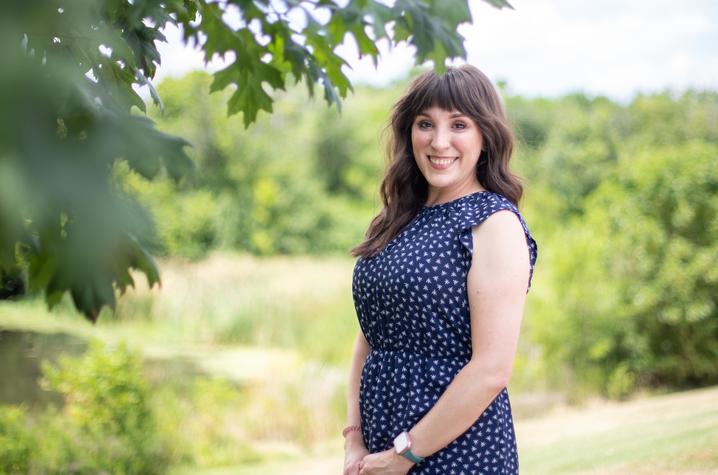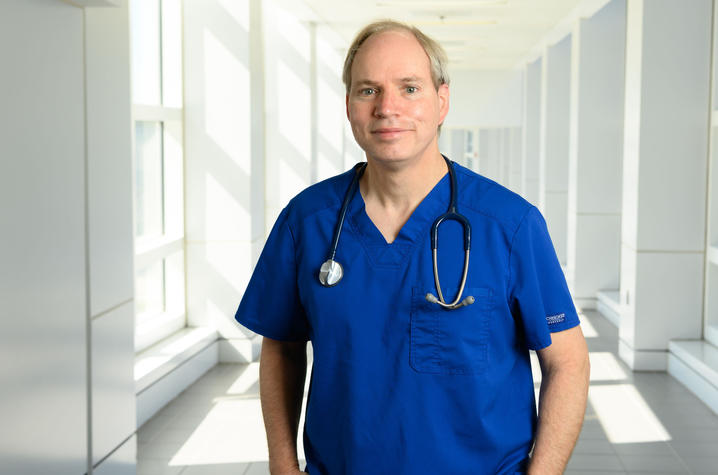From birth to adulthood: How UK HealthCare’s cystic fibrosis care has evolved
LEXINGTON, Ky. (Sept. 27, 2024) — For much of her childhood, Tiffany Arps was told she wouldn’t live very long.
At nine months old, Arps was diagnosed with cystic fibrosis (CF), a rare genetic disease that affects the lungs, pancreas and other organs. At the time, the late 1980s, many CF patients didn’t live beyond childhood.
“It was seen as a terminal illness,” Arps said. “My mom had the expectation that I may not make it out of childhood.”
Now, at 36, Arps has defied those expectations thanks largely to rapid advances in how CF is treated. According to data from the national Cystic Fibrosis Foundation, the number of adults living with the chronic disease has increased from just over 8,500 individuals in 2003 to more than 20,000 in 2023.
More than half of the babies born with CF between 2019-2023 are predicted to live beyond age 61, CF Foundation data estimates — assuming available CF treatments don’t change during their lifetimes. While care has improved over the decades, effective gene modulation therapies — which became widely available in 2019 — have increased the quality of life for many, but not all, CF patients.
‘Much more positive now’
Michael Anstead, M.D., the director of the Adult Cystic Fibrosis Center at UK HealthCare, has gotten a front-row seat to the improvements in care. Anstead has been taking care of patients at UK HealthCare’s Cystic Fibrosis Care Center since 1993.
“When I first started, we would diagnose a child with CF and have to paint a bleak picture for the parents so if anything went even a little better, at least they were happy,” Anstead said.
Instead, Anstead — who in February was recognized by the Cystic Fibrosis Foundation for 30 years of service — has been able to watch many of his patients grow from children with a dire diagnosis to adults pursuing their hopes and dreams while managing a chronic illness.
“We can be much more positive now,” he said. “If you’re on these therapies and we work with you, there’s a very good chance you’re going to have a long life.”
The Cystic Fibrosis Foundation mandated specialized care for adults with cystic fibrosis about 25 years ago, and the Adult Cystic Fibrosis Center at the University of Kentucky was established and has grown steadily. With the significant advances in survival in cystic fibrosis, the Adult Cystic Fibrosis Center now follows more patients with cystic fibrosis than the Pediatric Cystic Fibrosis Center. The accredited CF Center includes a multidisciplinary team that includes a nurse, respiratory therapist, social worker, dietitian and pharmacist in addition to physicians and nurse practitioners.
“We have this really outstanding team to support our patients,” Anstead said.
Arps, a native of Corbin, Kentucky, has been a patient at UK HealthCare’s Cystic Fibrosis Clinic for essentially her entire life. She now also works at UK HealthCare as a licensed clinical social worker in the Supportive Mental Health and Addiction Recovery Treatment (SMART) clinic.
“It has always felt like another home, because I am here so often,” said Arps, one of Anstead’s longtime patients. "The team makes you feel so comfortable, and I know they care.”
What is cystic fibrosis?
Many organs in the body like lungs, the pancreas and intestines are lined with salt channels that pump out salt and water. That salt and water help those organs perform essential functions.
“These salt channels help the lungs clear mucus, the pancreas to secrete its enzymes and the liver to flush out its bile,” Anstead said.
People with cystic fibrosis have a genetic mutation that negatively affects those salt channels, which can cause the lungs, pancreas, liver or other organs to get clogged and infected. Thick mucus can build up in the lungs, potentially hampering breathing and creating an environment where germs can thrive. Symptoms and their severity can differ from person to person. As a genetic disease, CF is not contagious.
For much of her life, Arps said she experienced chronic coughs to get the mucus out of her lungs. From a young age, she was taught multiple breathing treatments to help with that process. It was often a struggle, she said, to keep weight on as she experienced malnourishment from pancreatic insufficiency, malabsorption, and burning more calories due to the extra energy needed to breathe, and battling chronic infections.
Because cystic fibrosis patients can spread infection-causing germs to one another when in close contact, they’re typically discouraged from gathering — meaning it was hard to find a community facing the same challenges, Arps said. Social media and video calling have changed that in recent years.
Already self-conscious about her chronic cough, Arps faced questions from her peers in school: “Are you contagious? Why do you have to go to the nurse’s office during lunch? What’s wrong with you?”
“CF was more visible then,” Arps said. “I would say it’s less visible now since starting Trikafta in 2019.”
How is it treated?
The 1989 discovery of the gene that causes cystic fibrosis, the first disease-causing gene to be identified, paved the way for future discoveries. Treatment improved for decades, and the approval of the gene modulating drug Trikafta in 2019 was a major breakthrough.
The drug can essentially target and improve function in those mutant salt channels, and approximately 92-95% of CF patients have mutations that work with the medicine, Anstead said. On average, patients have about a 14% improvement in lung function — which can make a “tremendous” difference for patients.
“They don’t get sick nearly as often, they’re not hospitalized as often,” Anstead said. “We used to average six to eight adult patients in the hospital, now we average two to three.”
There’s been a 74% decrease in mortality in CF and an 88% reduction in the frequency of lung transplants since Trikafta came out, Anstead said.
Arps said she’s experienced a decrease in mucus and coughing. She still gets lung infections, but they’re not as severe.
“It takes a lot of energy to cough all day, everyday, so I notice I do have more energy now,” Arps said. “My throat and chest hurt less, I’m breathing a little better, and I’m not constantly clearing my throat anymore.”
There were already more adult patients than children four years ago, but with gene modulators, “every year we get more and more adults,” Anstead said. UK HealthCare has the largest adult cystic fibrosis clinic in the region — following close to 200 adult patients.
Milestones and hurdles
Adult CF patients are reaching milestones and navigating challenges they might’ve never imagined.
“Going to their graduations or their weddings is so exciting,” said Jamshed Kanga, M.D., a pediatric pulmonologist — who during his more than 40 years of service to CF patients established UK HealthCare’s Cystic Fibrosis Care Center. “Many of our patients have families and children.”
The availability of Trikafta has boosted fertility rates among women with CF, and many are having conversations about family planning and sexual health later in life than their peers, Arps said.
Patients are pursuing careers, Anstead said, and many have employers who are understanding that they’re dealing with a chronic disease. Some do, however, get sick and lose their job.
Living with a chronic illness influenced how Arps chose her career, she said. Initially, she wanted to be a doctor, but while on the pre-medicine track in college, she had doubts over whether that would be the best course while her disease progressed.
But with an interest in mental health and a desire to care for others, Arps pursued psychology and eventually became a therapist helping folks with substance use or mental health disorders.
“I work with a lot of people with chronic illness too, and I enjoy that,” Arps said. “I think having that perspective and understanding of what living with a chronic illness is like, I can really validate and support them.”
Arps has found other ways to care. In 2020, she joined the Cystic Fibrosis Patient and Family Advisory Council to both connect with other CF patients via telehealth and advocate for their needs at UK HealthCare.
Mental health and cystic fibrosis
Both Anstead and Arps agree that CF patients need more mental health support.
“Growing up hearing that I might not live very long felt weirdly normal,” Arps said. “But when I got to a certain age and realized what that meant, it was devastating.”
Arps has struggled with depression and anxiety her whole life. Especially when she was younger, she’d be in the midst of breathing treatments and wish she was doing something else.
“I would become frustrated, and still do, and would think to myself, ‘Why do I have to do this and other people don’t?’” Arps said. “Why am I not ‘normal?’ But really, what is normal? Normal is relative, but it can still be isolating at times.”
Kindness and compassion — that’s what Arps is hoping more folks can practice toward those with CF or any chronic illness.
“Recognize that everybody has different needs, abilities and boundaries,” Arps said. “Whether it’s mental or physical health struggles, don’t make assumptions and always practice kindness and compassion.”
UK HealthCare is the hospitals and clinics of the University of Kentucky. But it is so much more. It is more than 10,000 dedicated health care professionals committed to providing advanced subspecialty care for the most critically injured and ill patients from the Commonwealth and beyond. It also is the home of the state’s only National Cancer Institute (NCI)-designated Comprehensive Cancer Center, a Level IV Neonatal Intensive Care Unit that cares for the tiniest and sickest newborns and the region’s only Level 1 trauma center.
As an academic research institution, we are continuously pursuing the next generation of cures, treatments, protocols and policies. Our discoveries have the potential to change what’s medically possible within our lifetimes. Our educators and thought leaders are transforming the health care landscape as our six health professions colleges teach the next generation of doctors, nurses, pharmacists and other health care professionals, spreading the highest standards of care. UK HealthCare is the power of advanced medicine committed to creating a healthier Kentucky, now and for generations to come.






